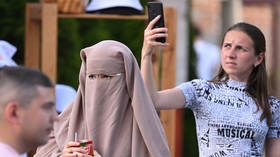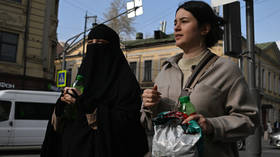Russian region to ban niqab
Dagestan is about to ban the niqab on religious grounds, the head mufti of the Russian republic announced on Monday. The regional governor has spoken out against the face covering on security grounds, following last month’s terrorist attack.
The niqab is a type of headdress that covers the entire face, except for the eyes, and is used by some Muslim women to obey the religious requirement to dress modestly.
“The Muftiate of Dagestan will soon issue a fatwa [theological opinion] banning the niqab,” Chief Mufti Akhmad Abdullayev said in a meeting with regional head Sergey Melikov.
Abdullayev acknowledged that many Russian Muslims might disagree with his decision, but said he didn’t much care about their opinion. “My attitude towards people who will criticize me is neutral,” the cleric said.
Valery Fadeev, the head of Russia’s Human Rights Council, had proposed a niqab ban in May, citing the need to crack down on Islamic militants after the Crocus City Hall attack that killed over 140 people. Moscow’s chief mufti, Ildar Alyautdinov, opposed the measure as abridging religious freedoms. The government eventually sided with the mufti.
Last week, however, several groups of militants attacked Christians and Jews in Dagestan, killing more than 20 people – including a dozen police officers – and injuring 40 more in Derbent and the regional capital of Makhachkala.
In the aftermath of the attack, governor Melikov called for banning the niqab, arguing that such garb represented an unacceptable security risk.
“First of all, this clothing is not typical for the peoples of the Caucasus. But I am also against this from a security standpoint,” he said.
The niqab “allows men to hide behind these veils, and women to carry prohibited items behind them,” Melikov explained, noting that he was saying it as someone who has “repeatedly carried out counter-terrorism missions.”
Alyautdinov, the Moscow mufti, has yet to comment on the Dagestani announcement. He previously told Russian media that the Muslim community would support a niqab ban only if law enforcement were able to prove a direct connection between wearing the garment and the growing risk of extremism.
You can share this story on social media:









Comments are closed.